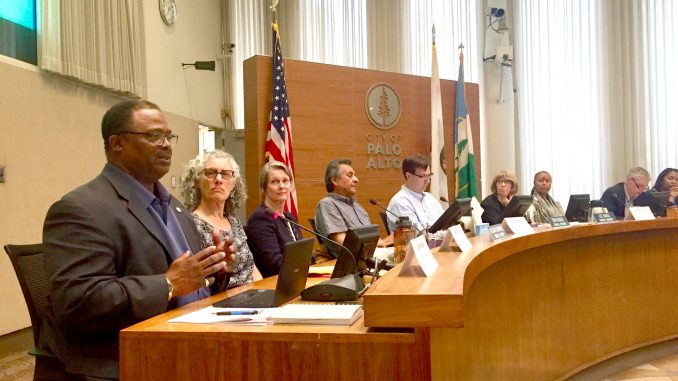
BY ALLISON LEVITSKY
Daily Post Staff Writer
At Palo Alto City Hall Monday night, some visiting East Palo Alto City Council members did something unthinkable for many Palo Altans: voice support for Senate Bill 50.
The discussion took place at a first-of-its-kind joint meeting between the councils of Palo Alto, East Palo Alto and Menlo Park.
Members of the three council all sat side by side on the dais, across from Palo Alto’s state legislative lobbyist, Niccolo De Luca.
De Luca, who is paid to lobby on behalf of Palo Alto’s interests with state legislators, told the councils that he didn’t know where state Assemblyman Marc Berman or state Sen. Jerry Hill stood with regard to SB50. Neither Berman nor Hill was present.
The study session focused on state housing legislation, particularly SB50, state Sen. Scott Wiener’s bill that would preempt local zoning to allow taller, denser housing near transit and elsewhere in employment centers like Palo Alto.
Several members of the public spoke critically of SB50, including former Palo Alto Vice Mayor Greg Schmid.
Schmid said the region was facing a “jobs crisis” — meaning there are too many jobs here — and that SB50 threatens to crowd families out of the area with dense housing.
“If SB50 passes, Silicon Valley will be more like San Francisco. Think about it: San Francisco has the lowest ratio of 5- to 17-year-olds in the country,” Schmid said. “If you support SB50, you will be challenging the future of families in the West Bay.”
But some East Palo Alto council members took a different point of view.
Helping your neighbors
East Palo Alto Councilman Larry Moody brought up the residents who had been pushed out of their homes and are now living in RVs on local streets.
“Those who are against SB50 typically have explored all the reasoning behind SB50, and how it’s going to impact them at their front door,” Moody said. “Are we willing to share our vast resources so that we can create a roof over someone who was once our neighbor’s head?”
East Palo Alto Councilman Ruben Abrica said that, contrary to some arguments against SB50, the state is “not at war with local control.” SB50 merely points to the fact that local control hasn’t worked to build enough housing, Abrica said.
Similarly, Menlo Park Councilwoman Cecilia Taylor said that SB50 exists “because we didn’t take care of our own city.”
East Palo Alto Councilman Carlos Romero noted that local control has a history of perpetuating “de jure” segregation, but also expressed concerns about SB50 displacing the poor in dense cities.
“I’m not saying that SB50 is the perfect bill. I actually have some real questions about it,” Romero said. “If we are going to give value to a developer by some sort of concession to build higher, this bill and our cities themselves have to require of those developers additional community benefits.”
Palo Alto Mayor Eric Filseth said he agreed with Romero.
Taylor said she wanted to see cities adopt an “all-inclusive policy” for development agreements on large commercial projects like Facebook’s.
Filseth pointed out that local control gives cities and counties more leeway than the state to demand benefits from developers, such as funds for affordable housing or transportation projects.
Traffic slows police
The councils also discussed transportation issues. Moody mentioned that an East Palo Alto police officer told him that it took him 40 minutes to cross town during rush hour.
Palo Alto Councilwoman Liz Kniss said that an East Palo Alto police officer who pulled her over recently told her that he never has to move from his post at University and Woodland avenues: he can sit there and write tickets all day because of the traffic.
Filseth closed the discussion by saying that the housing and transportation crisis did not emerge overnight and is unlikely to be fixed overnight.
“I’m glad to see us here as a group thinking about it together, and I hope we will do more of this, because it and other things like it are regional problems,” Filseth said. “There’s got to be some level of granularity in terms of regionalism between any one of our cities and the nine counties of the Bay Area or the state of California.”




While the criticism of the performance of cities in making way for new or rebuilt housing certainly is valid, the answer is not to relinguish all local control to developers empowered by the state government. First they came for the Socialists, the saying begins. State politicians are lobbied constantly by special interests looking for special favors. Those special interests – such as developers and corporate employers – can always make a pitch that they will act in the best interests of others – but that is not their incentive or motive. City and County governments, accountable to local voters, are far more likely to act fairly and in the public interest than are profiteers and their pr and political consultants. Some state standards are needed. Local financial incentives should be re-arranged. But throwing the baby out with the bath water would not be creating a bright future for the Golden $tate.
The fees and concession is what brought us here in the first place. In San Francisco and Los Angeles, a developer must give away 20%+ of the project to enrich the city bureaucracy. One way to stop SB50 is to make that fee 50%. No developer will do any project then.